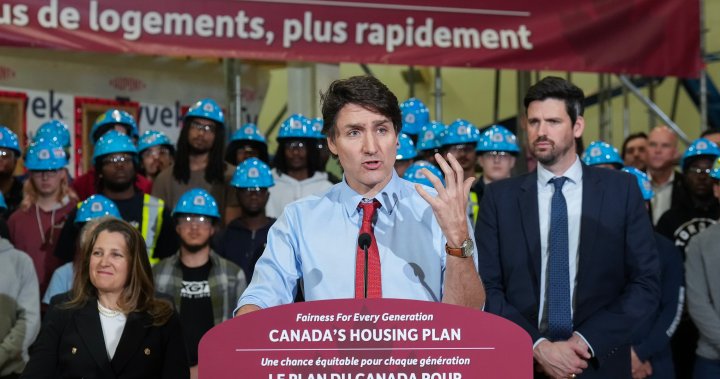The Liberal government is set to table its 2024 federal budget amidst challenges with a slowing economy and declining popularity in polls. Former parliamentary budget officer Kevin Page anticipates a tight spending plan with limited relief for cost-of-living issues. The Liberals have announced over $37 billion in new spending and loans, focusing heavily on the Canadian housing market, a national lunch program, expanded child-care access, defence spending, and artificial intelligence. Finance Minister Chrystia Freeland has pledged not to increase the deficit past $40.1 billion, but faces difficulties in balancing the deficit while meeting the needs of Canadians in a weak economy with higher interest rates.
Facing significant headwinds, the Liberals are limited in fiscal room to manoeuvre, with lower revenues and increasing debt expenses affecting the budget. An RBC economics report cautions against straying from fiscal anchors, which could lead to a downgrade in Canada’s credit rating and impact households and businesses. Increasing revenues through new taxes is one option, but Freeland has promised no new taxes on the middle class in the 2024 budget. Stronger-than-expected first-quarter GDP growth provides some breathing room for the government, but most spending has already been allocated, and no new major items are expected in the upcoming budget.
Voter demands for financial relief from the rising cost of living are clear, with pocketbook issues dominating the priorities for Canadians. Ipsos polling indicates that Canadians are looking for help with daily expenses, health-care investments, and reductions in personal taxes. However, the limited fiscal room leaves little space for significant relief efforts in the 2024 budget. The Liberals aim to show Canadians they are trying their best to act fiscally responsibly while supporting the most vulnerable. Efforts to address housing affordability are seen as incremental steps, but years of work are needed to solve the crisis.
Political polling shows the Conservatives leading by 18 points over the Liberals, who are only three points ahead of the NDP. To avoid falling into third place, the Liberals need to “stop the bleeding” and improve their standing with voters. With a federal election scheduled for no later than October 2025, a thin budget is expected this year, with major items potentially reserved for a pre-election budget next year. Economists predict a recovering economy in 2025, which could benefit the Liberals in future budgets. Rising revenues may boost electoral prospects and rebuild confidence in the government, providing ammunition for a stronger budget in 2025.
Overall, the Liberal government faces challenges in balancing fiscal responsibility with meeting the needs of Canadians in a weak economy. Limited fiscal room and voter demands for relief from the rising cost of living pose obstacles for the upcoming 2024 federal budget. With political pressures and an upcoming election, the government aims to navigate these challenges while maintaining confidence in its fiscal management. Future budgets, particularly in 2025, may offer opportunities for the Liberals to improve economic prospects and voter confidence through strategic fiscal planning.


